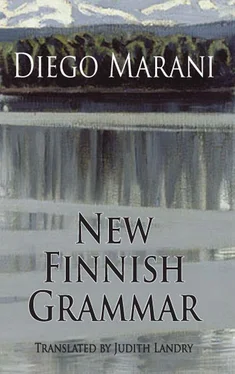At Hamburg, one autumn evening on my way back from the university, I had stopped to watch the sunset over the port. It was unusually mild for the time of year; the windows of the city were glowing red, the tram lines were a tangle of strips of blazing colour. Suddenly, in the pearly sky to the east, I saw a silent flock of migrating storks; soon they were above me, majestically large. Their shadow slipped over me like an embrace: up there in the soft air, the sight of them gave me a sudden feeling of peace. I gazed out over the iron-grey sea and allowed the beloved face of the girl I had left behind me in Helsinki to surface in my mind: I offered up that moment, that sunset, that flight of storks, to her. Some weeks later, I received a letter: words dry as thorns informed me, with brutal accuracy, how all that she had once felt for me was well and truly over. The date at the top of the letter, and the time of day, mentioned in the first few lines, told me that the words which were now crushing me had been written on the very evening that I had seen the storks. At the very moment I had been offering up that burst of joy to her, she had been signing my death sentence.
One evening in June, the pastor went away. He told me nothing about his intentions; indeed, he told nobody. He left no word, no message. From the surprise and bewilderment caused in the hospital by his departure I realized that he had long ceased to communicate with his colleagues on the medical staff, and indeed with the wounded whom he visited daily. He would talk to them, they said, but did not listen: it was as though he was always talking to the same person, carrying on with what he was saying to one when moving on to talk to the next. He seemed to speak in riddles, about a God whom he never referred to by name but whose end he sensed to be imminent; he had cut himself off from the world and lived like a castaway, alone with his thoughts, so that to leave was the most natural thing he could have done, an action which was quite simply the last step in a long and anguished process of estrangement.
Although I understood this only later, on his last evening the Military Chaplain Olof Koskela had in fact taken his leave of me, after his fashion. After the service I had blown out the candle on the altar and tidied away the missals, as I always did. The dread of yet another white night was looming; I lingered on among the pews, taking a little bite out of the endless hours when I was supposedly asleep. When I had done everything there could possibly be to do, when I had exhausted every excuse for further loitering, I went to the door of the sacristy to say goodnight to the pastor. I found him seated at the table, with the Kalevala open in front of him, the coloured illustrations glowing in the light of the setting sun. The little cupboard with the glass knobs was open and the bottle of koskenkorva was on the table, together with two small glasses, just as it always was during our lessons. Without further ado, I went in; Koskela waited for me to sit down. In the past, each time he had begun to speak, I would concentrate on his words, ever hopeful that I would understand him; and indeed, with time and practice, my understanding of his Finnish had broadened and deepened. But it was above all at the beginning of any speech, before I could tell where it was going, that I would surprise myself by leaping from one phrase to another without losing my balance. Words and thought ran straight as a pair of rails, and I would feel the engine of grammar springing smoothly and harmoniously into motion. But the higher he clambered up the steep slopes of his cosmogony, the harder I had to struggle to follow him. Sometimes, noticing that I was in difficulties, he would reformulate certain ideas in simpler terms; as time went by, however, less aware of my plight, he ceased to do so. So that night too I sat down in front of the pastor with my eyes fixed on his mouth, so as not to let one single movement of his lips escape me.
‘It was Väinämöinen, the great runoilija , who made a people of us. Before that we had been uncivilized, without a history, nomads who abandoned their dead wherever they happened to be. Väinämöinen gave us a land, taught us the art of working iron, the art of war, how to hunt and to grow crops. But there was just one thing Väinämöinen knew he could not do for us, namely, prevail over the evil that is inherent in all the things of this world: against that we are powerless, we and all other human beings. That was what Väinämöinen was thinking about on the evening of the great summer festival. After the hunt, while the bear meat was roasting in the coals, during the preparations for the great feast in celebration of the return of summer, of coots to the skies and salmon to the rivers, Väinämöinen was thinking back on his past life. The heroic age which had witnessed his birth was now long gone. Single-handedly he had broken up that earth, cleared it of woods and snakes. His people had grown in number; thanks to him, they were now acquainted with song, and the owners of the magic Sampo . Seated downcast before the fire on that June evening — because, even if the Kalavela does not say so, I am certain that it must have been an evening in June, every bit as white and dazzling as this one now — Väinämöinen realized that this last battle was to be one he could not win. Pain is not something that can be shared; each must pay his own dues. The great runoilija felt too old and weak to take on that last challenge along with all the rest; so he decided to go away, back to those still waters from which he had come, to the margins of the created world, the abode of Antero Vipunen and all the greatest shamans who, having left their bodies, wander around their empty carcasses as though around some ancient temple long since claimed by brambles.’
Here the pastor paused — for breath, I thought, or possibly for thought. But it seemed as if he were listening out for something, awaiting some sound. He went up to the window, straining his ears; I stayed where I was. But all that could be heard from outside was the sound of the wind in the trees. That seemed to bring him back to the present; he drained his glass of koskenkorva and carried on.
‘Beware how you bring up your sons, you future generations — do not let them be lulled to sleep by strangers. Children who are cradled without gentleness, raised uncaringly, dragged up harshly, will not become intelligent, will never have the gift of wisdom, will never become men, even should they grow up strong and healthy and live for a hundred years! It was with these words, so many years earlier, that the old Väinämöinen had responded to the news of the death of Kullervo, son of Kalervo. On the evening of the great banquet, no one would have thought to speak of it, to remind him of it — Kullervo after all had killed the wife of Ilmarinen, the virgin of Pohjola, he had violated his own sister and finally taken his own life, throwing himself upon his sword. But thinking of the evil by which man is dogged — which worms its way even into those things which are most beautiful, which tracks them down wherever they are hidden — Väinämöinen bethought himself of the ferocious Kullervo and his wretched life. Such ferocity is more than a man’s share. We find the seed of hatred on this earth and sow it along with the rye, believing it to be good. It was Untamo who sowed that hatred when he slaughtered the family of his brother Kalervo, burned down his village and dragged the only survivor, a pregnant woman, off to prison: the child who was born was Kullervo. His mother nurtured his hatred, fuelling his craving for revenge. He grew up in a state of slavery, and without memories, for there was nothing in his life to be remembered. From Untamo’s kindred he received kicks instead of fondling, insults instead of gentleness, hatchets for splitting wood instead of toys. From his mother, he received a grounding in ruthlessness. Day after day she would look into his heart, uprooting any shoot of tenderness because she wanted his soul to be a desert. Kullervo never knew what childhood was.’
Читать дальше












